张保红――文学翻译PPT课件
张保红文学翻译PPT课件
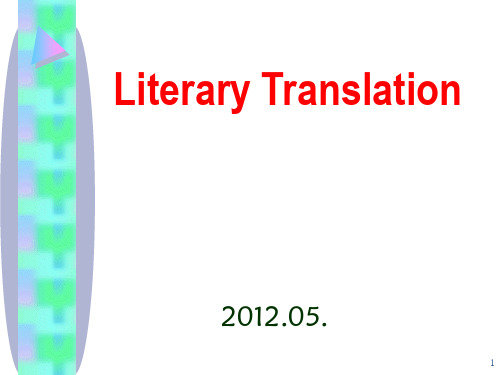
9
• 重译: • 西海的风啊, • 你轻轻地吹,轻轻地唱 • 西海的风啊, • 你轻轻地,轻轻地吹呀唱, • 越过波涛翻滚的海洋, • 掠过明月西沉的夜空,吹呀 • 再把他吹到我的身旁; • 我的小宝宝,我的乖宝宝,睡呀睡得香。
2 A Call on the Recluse Who Is Just Out
3
--- tr. Sun Dayu
3 A Hermit Visited but not Encountered
4
--- tr. Wan Changsheng & Wang Jianzhong
4 Looking for a Recluse but Failing to Find Him
11
• 译文: 一个刚从学校回来的年轻女士正 在解释。“拿一个鸡蛋,”她说, “在底部打一个孔,在顶点上打 一个相应的孔。然后把嘴唇放在 孔上,用力吸气,蛋壳里的东西 就会完全抽空了。”一个听她讲 的老妇人惊叫道:“如今的人做 事真奇怪,我作小孩的时候,他 们一头打个洞,就吸干了。”
12
• 译文: 一位刚从学校回家的女学生正在解 释:“取一枚鸡蛋,”她说,“在 蛋的底部打一个小孔,再在蛋的顶 点上打一个对应的小孔。然后将嘴 唇置于该孔之上并用力吸气,壳内 之物则尽释无遗。”一位听她讲话 的老太太嚷了起来:“如今的人做 事真叫人摸不着头脑,我作姑娘的 那阵儿,人们把蛋一头磕一个洞, 嘶溜儿一嘬就吃了。”
3 真实指涉性(真值性)VS 虚假指涉性(虚指性)
6
1. 文学语言的自指性:
英汉翻译教程张培基【完整版】
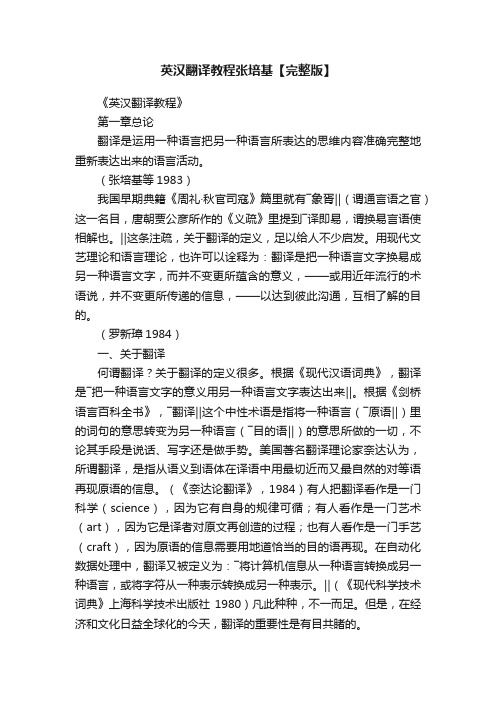
英汉翻译教程张培基【完整版】《英汉翻译教程》第一章总论翻译是运用一种语言把另一种语言所表达的思维内容准确完整地重新表达出来的语言活动。
(张培基等1983)我国早期典籍《周礼·秋官司寇》篇里就有―象胥‖(谓通言语之官)这一名目,唐朝贾公彦所作的《义疏》里提到―译即易,谓换易言语使相解也。
‖这条注疏,关于翻译的定义,足以给人不少启发。
用现代文艺理论和语言理论,也许可以诠释为:翻译是把一种语言文字换易成另一种语言文字,而并不变更所蕴含的意义,——或用近年流行的术语说,并不变更所传递的信息,——以达到彼此沟通,互相了解的目的。
(罗新璋1984)一、关于翻译何谓翻译?关于翻译的定义很多。
根据《现代汉语词典》,翻译是―把一种语言文字的意义用另一种语言文字表达出来‖。
根据《剑桥语言百科全书》,―翻译‖这个中性术语是指将一种语言(―原语‖)里的词句的意思转变为另一种语言(―目的语‖)的意思所做的一切,不论其手段是说话、写字还是做手势。
美国著名翻译理论家奈达认为,所谓翻译,是指从语义到语体在译语中用最切近而又最自然的对等语再现原语的信息。
(《奈达论翻译》,1984)有人把翻译看作是一门科学(science),因为它有自身的规律可循;有人看作是一门艺术(art),因为它是译者对原文再创造的过程;也有人看作是一门手艺(craft),因为原语的信息需要用地道恰当的目的语再现。
在自动化数据处理中,翻译又被定义为:―将计算机信息从一种语言转换成另一种语言,或将字符从一种表示转换成另一种表示。
‖(《现代科学技术词典》上海科学技术出版社1980)凡此种种,不一而足。
但是,在经济和文化日益全球化的今天,翻译的重要性是有目共睹的。
翻译是国际间理解的钥匙,据说西欧的文明归功于翻译者(据L·G·凯里1979)。
季羡林教授也说,翻译是永葆中华文明青春的万应灵药。
前中国驻联合国代表凌青先生说,从中国来讲,没有翻译工作,就没有中国***和中国近代的革命运动,就没有中国成功的对外开放和四个现代化;从世界范围来讲,没有翻译,就没有世界和平,就没有各种国际交往,就没有一个共同繁荣的美好世界的未来。
英汉翻译教程张培基【完整版】

英汉翻译教程张培基【完整版】《英汉翻译教程》第一章总论翻译是运用一种语言把另一种语言所表达的思维内容准确完整地重新表达出来的语言活动。
(张培基等1983)我国早期典籍《周礼·秋官司寇》篇里就有―象胥‖(谓通言语之官)这一名目,唐朝贾公彦所作的《义疏》里提到―译即易,谓换易言语使相解也。
‖这条注疏,关于翻译的定义,足以给人不少启发。
用现代文艺理论和语言理论,也许可以诠释为:翻译是把一种语言文字换易成另一种语言文字,而并不变更所蕴含的意义,——或用近年流行的术语说,并不变更所传递的信息,——以达到彼此沟通,互相了解的目的。
(罗新璋1984)一、关于翻译何谓翻译?关于翻译的定义很多。
根据《现代汉语词典》,翻译是―把一种语言文字的意义用另一种语言文字表达出来‖。
根据《剑桥语言百科全书》,―翻译‖这个中性术语是指将一种语言(―原语‖)里的词句的意思转变为另一种语言(―目的语‖)的意思所做的一切,不论其手段是说话、写字还是做手势。
美国著名翻译理论家奈达认为,所谓翻译,是指从语义到语体在译语中用最切近而又最自然的对等语再现原语的信息。
(《奈达论翻译》,1984)有人把翻译看作是一门科学(science),因为它有自身的规律可循;有人看作是一门艺术(art),因为它是译者对原文再创造的过程;也有人看作是一门手艺(craft),因为原语的信息需要用地道恰当的目的语再现。
在自动化数据处理中,翻译又被定义为:―将计算机信息从一种语言转换成另一种语言,或将字符从一种表示转换成另一种表示。
‖(《现代科学技术词典》上海科学技术出版社1980)凡此种种,不一而足。
但是,在经济和文化日益全球化的今天,翻译的重要性是有目共睹的。
翻译是国际间理解的钥匙,据说西欧的文明归功于翻译者(据L·G·凯里1979)。
季羡林教授也说,翻译是永葆中华文明青春的万应灵药。
前中国驻联合国代表凌青先生说,从中国来讲,没有翻译工作,就没有中国***和中国近代的革命运动,就没有中国成功的对外开放和四个现代化;从世界范围来讲,没有翻译,就没有世界和平,就没有各种国际交往,就没有一个共同繁荣的美好世界的未来。
第六小组 终版

高昂亢奋 开始爆发
7,000,000 Dutch men, women and children will want to be there to curse him during his dying moments.
A plebiscite was taken as to whether this was a fitting punishment. There was 4,981,076 yeas and one nay. The nay was voted by a man who preferred that Hitler be pulled to pieces by four horses.
可以看出人们似乎失去了“理智”,希特勒很 残暴,但是人们处死希特勒的方式似乎比
希特勒还要“残暴”,有强烈的讽刺意味。
故事情节
结构 开端 发展 高潮 结局
故事情节 讨论死刑 投票决定 执行火刑 火刑停止
段落 1-3 4 5-9 10-14
二、作品概述
从以上对文章的背景、人物、情节的分析,我们可以看 出,这篇文章文字浅显流畅、通俗易懂,故事情节跌宕起 伏,环环相扣,人物形象鲜明,字里行间都能体会到人们对 希特勒的仇恨。但是从群众处死的方式中,我们也可以感受 到强烈的讽刺意味。
➢此时作者笔下的民众深受希特勒迫 害,家破人亡,作者的描写体现了 对饱受战争之苦的人民的同情。
三、原文审美鉴赏
三、原文审美鉴赏
(一)节奏美 (二)语义美 (三)修辞美 (四)形象美
(一)节奏美
节奏美,除了表现在声调的轻重缓急,句子 的长短整散等语言构成的外在形式节奏上,还表 现在情绪自然消长的内在节奏上。
(张保红,2011:142)
广外高翻学院文学翻译课件

• 3)频繁出现的中心词 • dedicate出现了5次,conceive、 consecrate、devotion各出现了2次。 • 同义复现的有: liberty / freedom, brought forth / created / nobly advanced, long endure / not perish, dedicate / devote / give their lives / gave the last full measure of devotion等等, • “奉献”“创造”“自由”等成为 中心词或主旋律。
• 以上两例似可分别合并为: • We are met on a great battle-field of that war in order to dedicate a portion of the field as a final resting place for those who here gave their lives that that nation might live. • But in a larger sense, we can not dedicate, nor consecrate and nor hallow this ground. • 表达的重点、力量 只有266个字的演讲词中,用了大量具有 长元音、双元音的词语,平稳或调节着 演讲的速度,也使演讲的效果铿锵有力, 掷地有声。 • 以第1段为例,长元音、双元音的词语有: fourscore, years, ago, our, fathers, brought, forth, ……。这些词语使演讲开始的语调 徐缓而温和,进入主题自然而然,同时 词语音调的抑扬顿挫既抓住了听众的注 意力,也表现了作者的情感。
• 4 修辞美 • 演讲词共10句,修辞特征有:① 均为完整的陈述句, ②结构相似 的整句与圆周句较多。 • ①使表达的信息显得肯定、正式、 庄重,给人信心十足的感受; • ②使表达的信息重点突出,表达 的情感推波助澜,从而产生强烈 的艺术感染力。
张保红文学翻译小说英译汉作业

方明明文学翻译小说英译汉从土耳其来的侄儿伊利亚斯·哈里尔著去年的一天,突然响起了敲门声。
我的侄儿没打声招呼就从土耳其来了!我上一次见他时,他才到我膝盖,像蚱蜢似的小不点儿,长了一双怯生生的眼睛,两只像一双扇子的耳朵,没了俩门牙,头发短短的,和永远脏兮兮的手。
你知道,每一个侄子基本都长这样儿。
我喜欢这孩子,对他很钟爱。
用他那小不点的身高,他总是仰脸瞅着我好似在看一根电话线杆子,他的大眼睛笑着总能把我逗乐。
从短裤里露出的两条腿有点罗圈腿。
两只眼睛虽然直视着你但有点斗鸡眼。
我看着他的时候有点怜惜他······所以我从来没有对他发过火也没有打过他。
我俩说话时,他肩膀上好似放的有重重的东西,表现出防御的样子。
他要是犯错了,这个特点会更明显。
他的眼睛渐渐湿润,声音小的都听不到;颤抖的像一片叶子。
谁看见他都会以为他是一个孤儿会为之难过。
他们就想给他点儿钱或是一些糖果。
因为一些事我打过其他的侄子,但是从来没碰过他一根手指头。
我爱他还爱不够呢!在家时,不管谁惹大人生气了,我的这个小侄儿都能让自己离得远远的。
要是你跟他说话,他就不回答。
如果他回答了也是声音小小的。
你就是打他他也是安静的。
挨打的时候,叫的声音不是越来越大,而是逐渐降低。
因此,打他的那个人怒气会变成同情,于是这小男孩就逃过了更多的惩罚。
我是很久之后才总结出来,他跟其他人说话时,既不会罗圈腿也不会斗鸡眼耳朵更不会像飞落的叶子。
还有,他生气的时候,他知道怎样吵个不停。
要是他知道危险临近(要挨打了)他就会罗圈腿、斗鸡眼、耳朵拉长。
我移民加拿大之后有十五年没见到侄儿了。
现在他已经长成魁梧的大小伙儿了,英俊健壮!表示欢迎之后,我问了他一些问题,想知道他来这里的原因。
“侄儿,你想找什么样的工作啊?”“啊,蒙主的恩准,叔叔,我愿干任何的工作。
我什么都能干。
只要说得出来我就能干。
我什么都干过。
干过木匠、电工、货郎、修鞋匠、裁缝、汽车修理工;您还要吗?这些我都干过。
100本口笔译教程资料下载汇总
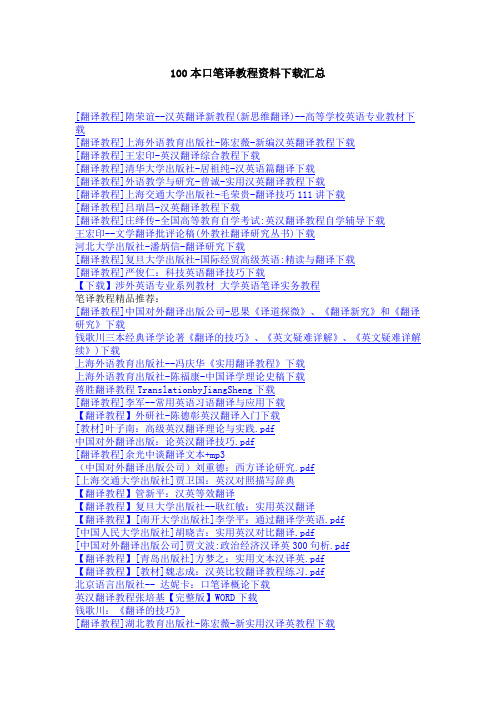
100本口笔译教程资料下载汇总[翻译教程]隋荣谊--汉英翻译新教程(新思维翻译)--高等学校英语专业教材下载[翻译教程]上海外语教育出版社-陈宏薇-新编汉英翻译教程下载[翻译教程]王宏印-英汉翻译综合教程下载[翻译教程]清华大学出版社-居祖纯-汉英语篇翻译下载[翻译教程]外语教学与研究-曾诚-实用汉英翻译教程下载[翻译教程]上海交通大学出版社-毛荣贵-翻译技巧111讲下载[翻译教程]吕瑞昌-汉英翻译教程下载[翻译教程]庄绎传-全国高等教育自学考试:英汉翻译教程自学辅导下载王宏印--文学翻译批评论稿(外教社翻译研究丛书)下载河北大学出版社-潘炳信-翻译研究下载[翻译教程]复旦大学出版社-国际经贸高级英语:精读与翻译下载[翻译教程]严俊仁:科技英语翻译技巧下载【下载】涉外英语专业系列教材大学英语笔译实务教程笔译教程精品推荐:[翻译教程]中国对外翻译出版公司-思果《译道探微》、《翻译新究》和《翻译研究》下载钱歌川三本经典译学论著《翻译的技巧》、《英文疑难详解》、《英文疑难详解续》)下载上海外语教育出版社--冯庆华《实用翻译教程》下载上海外语教育出版社-陈福康-中国译学理论史稿下载蒋胜翻译教程TranslationbyJiangSheng下载[翻译教程]李军--常用英语习语翻译与应用下载【翻译教程】外研社-陈德彰英汉翻译入门下载[教材]叶子南:高级英汉翻译理论与实践.pdf中国对外翻译出版:论英汉翻译技巧.pdf[翻译教程]余光中谈翻译文本+mp3(中国对外翻译出版公司)刘重德:西方译论研究.pdf[上海交通大学出版社]贾卫国:英汉对照描写辞典【翻译教程】管新平:汉英等效翻译【翻译教程】复旦大学出版社--耿红敏:实用英汉翻译【翻译教程】[南开大学出版社]李学平:通过翻译学英语.pdf[中国人民大学出版社]胡晓吉:实用英汉对比翻译.pdf[中国对外翻译出版公司]贾文波:政治经济汉译英300句析.pdf【翻译教程】[青岛出版社]方梦之:实用文本汉译英.pdf【翻译教程】[教材]魏志成:汉英比较翻译教程练习.pdf北京语言出版社-- 达妮卡:口笔译概论下载英汉翻译教程张培基【完整版】WORD下载钱歌川:《翻译的技巧》[翻译教程]湖北教育出版社-陈宏薇-新实用汉译英教程下载[翻译教程]上海紧缺人才培训工程教学系列丛书-齐伟钧基础口译教程文学文化类翻译教程:卢红梅:《华夏文化与汉英翻译》清华大学出版社-辜正坤--中西诗比较鉴赏与翻译理论下载张培基《英译中国现代散文选》WORD下载中国翻译-杨平-名作精译—英译汉选萃下载CATTI备考资料--[青岛出版社]杨平编《名作精译》汉译英下载【翻译教程】刘重德:文学翻译十讲.pdf文学翻译实用指南Literary Translation-A Practical Guide【翻译教程】(英文原版)文化构建:文学翻译论集.pdf【翻译教程】张保红:汉英诗歌翻译与比较研究【翻译教程】许钧等:文学翻译的理论与实践-翻译对话录【翻译教程】张今:文学翻译原理.pdf【翻译教程】郭延礼_中国近代翻译文学【翻译教程】北京大学出版社-孔慧怡-翻译文学文化.pdf英国诗选-卞之琳译+卞之琳的翻译思想与译诗实践漫谈期刊【翻译教程】陈定安:英汉修辞与翻译【翻译教程】查良铮:雪莱抒情诗选英译.pdf【翻译教程】2本李延林等:英语文化翻译学教程(理论+实践).pdf科技类翻译教程:【翻译教程】张宗美:科技汉英翻译技巧.pdf【翻译教程】郭建中:科普与科幻翻译-理论、技巧与实践.pdf【翻译教程】聂继武:科技英汉翻译技巧商务类翻译教程:【翻译教程】翁凤翔:当代国际商务英语翻译【翻译教程】梅德明:新编商务英语翻译【翻译教程】介绍翻译研究 Introducing Translaiton Studies.rar 【翻译教程】古今明--实用英汉翻译教程下载【翻译教程】英汉互译-方法与实践.rar【翻译教程】孙迎春:汉英双向翻译学语林.pdf一得集:翻译家谈英语学习pdf下载【翻译教程】杜建慧等:翻译学概论.pdf【翻译教程】翻译与翻译过程:理论与实践.pdf【翻译教程】Edwin Gentzler:当代翻译理论(第二版)【翻译教程】各类翻译期刊集合【翻译教程】杨丰宁:英汉语言比较与翻译【翻译教程】兰少宪:实用翻译理论与实践【翻译教程】赵明:语际翻译与文化交融--汉英互译的理论与实践【翻译教程】英汉翻译技巧与赏析.rar翻译绪论翻译概述【翻译教程】轩治峰:新编英汉翻译技巧【翻译教程】程永生:描写交际翻译学.pdf【翻译教程】蒋坚松和黄振定--语言与翻译研究.pdf【翻译教程】张光明:英汉修辞思维比较与翻译【翻译教程】廖七一等:当代英国翻译理论【翻译教程】刘季春-实用翻译教程.pdf【翻译教程】刘牟尼-汉译英指南.rar[翻译教程]徐亚男-外事翻译-口译和笔译技巧.pdf【翻译教程】稽德全:汉英翻译研究与实践.pdf【翻译教程】黄新渠:汉译英基本技巧(修订本)【翻译教程】陈廷祐:跟我学翻译-英语汉译技巧.pdf中国翻译通史-古至今下载[翻译教程下载]英汉互译-方法与实践.rar口译教程精品推荐:[下载]《汉英口译实践》(作者:梅德明)电子版【翻译教程】[外语教学与研究出版社]吴冰--现代汉译英口译教程【翻译教程】[复旦大学出版社]康志峰:英语中级口译指南【翻译教程】张文:汉英英汉高级口译教程【翻译教程】[中国对外翻译出版]杨承淑--口译教学研究-理论与实践【翻译教程】[上海外语教育出版社]林郁如:新编英语口译教程教师用书【翻译教程】[世界图书出版社]李天舒:最新简明英语口译教程.rar 【翻译教程】武汉大学出版社-王吉玉:简明口译教程.pdf实用英语口译教程WORD+MP3下载【翻译教程】吴冰:大学英语口译(汉英)教程【翻译教程】张清平:英语口译基本技能【翻译教程】易宏根:英语专业系列教材英语口译教程(2)【翻译教程】杨恩堂:英语口译技巧[翻译教程]刘和平教授关于口译的讲座MP3【翻译教程】崔永禄:实用英语口译(英汉)新编【翻译教程】陈振东--英汉汉英口译基础教程.rar【翻译教程】阎勇--汉英口译实用词语【翻译教程】马大森--英汉汉英口译教程【翻译教程】让.艾赫贝尔:口译须知.pdf【翻译教程】张坤鹏:口译知识与技巧.pdf商务现场口译课件20单元PPT下载翻译拓展与练习:欧盟口译教程教学视频下载翻译拓展--中英文原版小说等下载集合翻译词汇大全汇总贴翻译阅读--经济学人等权威新闻杂志电子版PDF下载汇总外交部、国内外名人致辞及热点话题中英文对照WORD。
《第一讲翻译概述》PPT课件

五、 翻译的起源 (The Origin of Translation)
最早的翻译是口译。翻译的历史和语 言的历史一样长。中国最早的有记载 的翻译始于汉代--西汉(Han Dynasty-Xi Han.)。大约在2000前。我国的翻 译活动经历了五个发展时期。
具体方法:
逐句 sentence by sentence interpretation 逐段 paragraph by paragraph interpretation 即席 impromptu/extemporaneous
interpretation 读稿 interpretation by reading the passage 同声 speech and interpretation at the same
王勃:“海内存知己,天崖若比邻”
科学翻译: If you've on earth a bosom friend He is near you to you though at world apart.
文学翻译: If you have friends who know your heart, Distance cannot keep you apart.
玄奘:
曾于唐太宗贞观2年(公元628年)去 印度求经,17年后带回57部佛经。其 中30部是因明学(逻辑学)。并将75 部 译为汉文。更重要的是他首次进行 汉译外的尝试,把老子的部分著作译 为梵文。成为汉以外的鼻祖。在理论 上,他提倡“既须求真,又须喻俗” 的翻译标准,对后世的翻译实践和理 论研究影响深远。玄奘、鸠摩罗什和 真谛一直被视为我国佛教学三大翻译 家。
我们也尝试给翻译下个定义:翻译是把一种语 言表达的意义用另一种语言传达出来,以达到 沟通思想情感,传播文化知识,促进社会文明, 特别是推动译入语文化信兴旺发达的目的。
文学翻译的学思用(三)——破“译”精彩的密码

话。合格的译者可以做到双语转换,而好的翻译家能够做到与作者心灵上的
沟通。译者的用笔犹如一列磁悬浮列车,既没有亦步亦趋地贴在原作的文字
上,却又飘然自得地运行在作者心灵的轨道上。
□
2024·01 英语世界
学苑 113
臻此境的喟叹,甚至笃信这样的译例只可鉴赏远观,亲自实操很难。而加 深这一“信念”的还有平常所见到的套语式译评分析:译文读起来文从字顺, 朗朗上口,形式整饬,节奏优美,用词精到,意蕴豁然,给人以美的享受。 这类译评广义来说固然适切,但常常让人知其然而不知其所以然。因此, 如何走近精彩的译例,破解其中的密码,以备来日不时之需,这是我们需 要直面的话题。且引一例如下,试作演绎,就教于方家学人,相互切磋, 共同提高。
其最后所演绎出的是整齐中有变化、变化中有统一的审美节奏。从思维方
式看,原文先说结果,后说引起结果的种种现象,而译文先说现象,后说
由种种现象导致的结果,这是中西思维方式上的差异,上引译文的译者深
谙此道,前后腾挪,彼此调换,自然得体,恰到好处。至此,从语义的准
确到语言的质感,从节奏的建立到运思方式的转换,译者走完了自己的再
It was a day as fresh as grass growing up and clouds going over and butterflies coming down can make it. It was a day compounded from silences of bee and flower and ocean and land, which were not silences at all, but motions, stirs, flutters, risings, fallings; each in its own time and matchless rhythm. (The Vacation)
精编张保红——文学翻译资料

3 A Hermit Visited but not Encountered
--- tr. Wan Changsheng & Wang Jianzhong
4 Looking for a Recluse but Failing to Find Him
--- tr. Burton Watson
张驼提盒去探亲, 李驼遇见问原因, 赵驼拍手哈哈笑, 世上原来无直人。
寻隐者不遇 贾岛
松下问童子, 言师采药去。 只在此山中, 云深不知处。
标题的翻译
1 A Note Left for an Absent Recluse
--- tr. Witter Bynner
2 A Call on the Recluse Who Is Just Out
3)现象学家英伽登的“五分法”:
①字音层:字音、字形等语义与审美意义。
②意义单位:句法结构都有它的意义单元。
③图式化方面:每一所写客体都是由诸多 方面构成,在文学作品中出现时只能写 出其某些方面。
④被再现客体:文学作品中所表达的人、 物、情、事等。
⑤形而上性质层:揭示生命和存在更深的 意义,如作品中所表现出的悲剧性、戏 剧等。
• 职业道德:“就是责任心,对自己负责,对他 人负责,对艺术负责。换言之,也就是要真实, 对自己真实,对他人真实,对艺术真实。”
• 扎实的双语语言功底:具有较强的驾驭译出语 和译入语的双语能力,具有较为出色的双语写 作技能,能正确理解原文,熟练运用双语。
• 广博的文化知识:相关国家的文化背景知识 (如历史、宗教、政治、地理、军事、外交 等),中西文化差异的知识以及翻译理论与翻 译研究相关学科的知识(如语言学、哲学、文 学、美学、心理学等)。
《修辞与翻译》课件

新闻报道的修辞与翻译
总结词
新闻报道的语言客观、准确,翻译时应注重信息的准确 传递。
详细描述
新闻报道的语言客观、准确,修辞手法相对较少。在新 闻报道的翻译中,译者需要注重信息的准确传递,避免 因修辞手法的不当运用而导致信息的误传。同时,译者 还需要注意新闻报道的语言风格和语体特点,保持译文 的客观性和准确性。
反语的翻译
反语是指用反义词或具有相反含义的词来表 达意思,在翻译时需要理解反语的含义,并 转化为目标语言中的相应表达。
修辞在翻译中的重
03
01
修辞的运用可以使译文更加自然、流畅,符合目标 语言的表达习惯,提高译文的易读性。
02
通过修辞手法,可以更好地处理句子的语序、语气 和节奏,使译文更加地道,易于理解。
《修辞与翻译》ppt课 件
目录
• 修辞与翻译的概述 • 常见修辞手法在翻译中的应用 • 修辞在翻译中的重要性 • 翻译中的修辞技巧与策略 • 修辞与翻译实践案例分析 • 总结与展望
修辞与翻译的概述
01
修辞的定义与功能
修辞的定义
修辞是一门研究语言使用和表达的艺 术,旨在通过特定的表达方式来增强 语言的表达效果和说服力。
提高译者修辞素养的重要性
1 2
提升译文质量
具备良好修辞素养的译者能够更准确地把握原文 意义,运用恰当的修辞手法传达原文的情感和意 图,提高译文质量。
增强跨文化交流能力
修辞素养有助于译者更好地理解和应对不同文化 背景下的语言差异,增强跨文化交流能力。
3
培养综合素质
修辞素养的提升有助于译者培养创新思维、批判 性思维等综合素质,提高职业竞争力。
转换语言风格
根据目标读者的需求和接受 度,对原文的语言风格进行 适当的转换,以使译文更加 贴切自然。
张保红——文学翻译分析
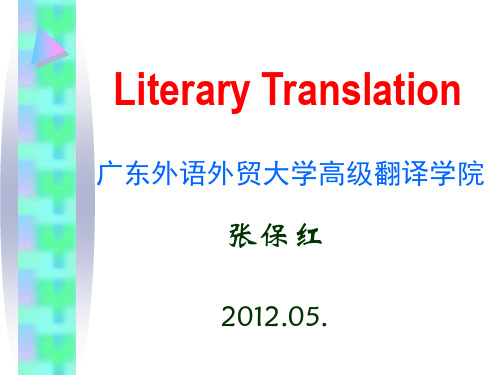
《英语世界》2012(2):4-6
• 主要内容 1 文学语言的基本特性 2 文本层次论与翻译研究 3 文学译者的素质要求 4 文学翻译的原则 5 译例演示
一 文学语言的基本特性
指义性 VS 审美性
1 外部指涉性(他指性)VS 自我指涉性(自指性)
2 直接指涉性(直指性)VS 间接指涉性(曲指性)
3 真实指涉性(真值性语言话语突出和显示自身。其表现在:
--语音:日常语言注重意思的表达,发音 是否悦耳动听,节奏是否抑扬顿挫等就 顺其自然、比较随便;文学语言关注发 音谐拗、节奏疾徐、韵律有无等。
--语法:文学语言往往会偏离日常语言语 法规范,如语序调整,词性变换等。
2.文学语言的曲指性:
采用曲折迂回手法表达意思
--原因:作者的表意策略;形象指涉的内 容具有某种不可穷尽性特点;读者想象 与回味的审美要求。
--表现:各种修辞手段或含蓄手法。
--结果:“言有尽而意无穷” “言在此而 意在彼” “不着一字,尽得风流”。
--目的:强化和深化审美效果和艺术感染 力。
三驼图(明)李士达
--- tr. Sun Dayu
3 A Hermit Visited but not Encountered
--- tr. Wan Changsheng & Wang Jianzhong
4 Looking for a Recluse but Failing to Find Him
--- tr. Burton Watson
文学翻译工作者戒 (译事十戒;译事十法) 《英语世界》2012(3):4-6
2)文学翻译由来已久,而且现在的本科翻 译专业基本上走的都是文学翻译的老路 子,……,仍然重复文学翻译的课程设 置,…… 《中国翻译》2012(1):26 (文学翻译“假想
翻译课件 第一章~1
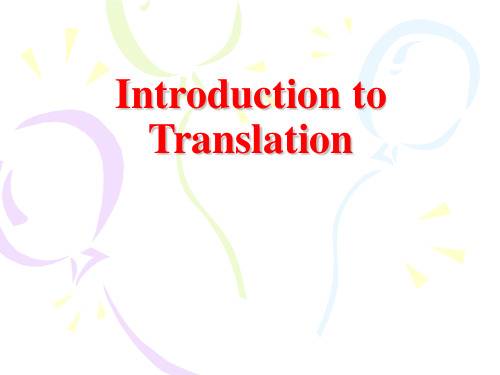
• (6) John can be relied on. He eats no fish and plays the game. • 约翰为人可靠,他既忠诚又办事公道. • (7) Wall Street is a dog-eat-dog place. • 华尔街是个残酷的地方.
教学目的与要求
• 教学目的: 阐释翻译的性质与特点、介绍翻译的基本理论、 概括翻译的常用技巧、揭示英汉语言、文化、思 维的差异、提高英语理解和汉语表达水平,加强 文字素养、培养跨文化交流的能力。 • 教学要求: 能灵活地运用所学翻译理论与常用技巧,发挥主 观能动性,做到忠实、通顺地翻译中等难度的文 学作品节录,以及英美报刊杂志有关政治、经济、 历史、文化等时文;提高逻辑思维、形象思维、 经验思维等认知能力,通过翻译表现出较高的综 合素养。
A quiz
• 1)It is a good father that knows his son. • 2) I have no opinion of that sort of person. • 3) I was the youngest son, and the youngest but two. • 4) The picture flattered her. • 5) The country not agreeing with her, she returned to England.
2) Party officials worked long hours on meager food, in cold caves and by dim lamps. 党的干部住寒冷的窑洞,吃简陋的饮食, 靠微弱的灯光,长时间地工作着。
• 词组 3) 风和日丽之时,佘山、金山、崇明岛隐隐可见。 原译:On a day of gentle breeze and bright sun, the Tower dominates an indistinct view of … 改译:On a fine day, you can even see …in the distance, though not very clearly. 4) In the doorway lay at least twelve umbrellas of various colors and sizes. 门口堆着至少十二把各种颜色和尺寸的伞. Ref. 门口堆着一堆伞,少说也有十二把,五颜六色, 大小不一.
chapter 1 general principles 连淑能《英译汉教程》(课堂PPT)

.
19
1. languages involved
translation from native language into a foreign language and vice versa.
.
20
2. working style oral translation/ interpreting 口译
❖the rhetoric and expressiveness of translation; the importance of readability.
❖主张“文”的翻译家强调翻译的修 辞和通顺; 强调译文. 的可读性; 24
❖the faithfulness and intelligibility of translation
— John Catford 翻译是把一种语言(源语)的文字材料 转换成另一种语言(译语)的对等的文 字材料。
.
17
❖翻译就是用一种语言把另一种语言 在内容与形式不可分割的统一中所 业已表达出来的东西准确而完全地 表达出来。 ——安德烈·费道罗夫
.
18
❖ 翻译是把一种语言的言语产物在保持 内容方面(也就是意义)不变的情况 下改变为另外一种语言的言语产物的 过程。 ——巴尔胡达罗夫
.
31
❖ “翻译必须有异国情调,就是所谓洋气。其实 世界上也不会有完全归化的译文,倘有,就是 貌合神离,从严辨别起来,它算不得翻译。凡 是翻译,必须兼顾着两面,一当然力求其易解, 一则保存着原作的丰姿,但这保存,却又常常 和易懂相矛盾:看不惯了。不过它原是洋鬼子, 当然谁也看不惯,为比较的顺眼起见,只能改 换他的衣裳,却不该削低他的鼻子,剜掉他的 眼睛。我是不主张削鼻剜眼的,所以有的地方, 仍然宁可译得不顺口。”
翻译鉴赏与批评(2)PPT课件
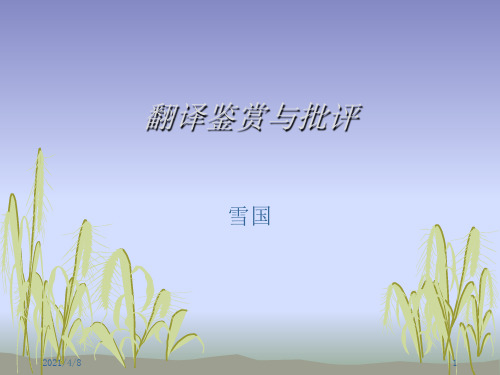
20
• デジタル大辞泉の解説
• ふ‐と
• [副] 1 はっきりした理由や意識もないままに事が起こるさま。思い がけず(以外的,意料不到的)不意に(突然地)。ふっと。 「―立ち止まる」「夜中に―目がさめた」 2 素早く容易に行われるさま。すぐに。即座に。 3 動作の敏速なさま。つっと。 [補説]「不図」「不斗」などと当てても書く。 「竜あらば、―射殺して」〈竹取〉 「猫また、あやまたず足もとへ―寄り来て」〈徒然・八九〉
• 主语
2021/4/8
12
2021/4/8
13
デジタル大辞泉の解説
たより‐な・い【頼り無い】 [形][文]たよりな・し[ク] 1 たよりにならない。あてにならない变化的。心もとない。靠不住,心里
没底「―・い返事」「―・い人」 2 たよりになるものがない。
[派生]たよりながる[動ラ五]たよりなげ[形動]たよりなさ[名] 「由縁(ゆかり)の人を失い、―・き身となりしにつけ
2021/4/8
4
もう三時間も前のこと、島村は退屈まぎれに左 手人差指をいろいろに動かして眺めては、結局 この指だけが、これから会いに行く女を生ま生 ましく覚えている
•
• 私:已经是三个小时之前的事情了,岛村过于无聊心不在焉的看 着在眼前划来划去的左手食指,终究也只有这只手指才能使她鲜 明的记起即将要去见的那个女人。
2021/4/8
15
濡れる
•
雪国呈现出来的意象总是有种寂静清冷的感觉,
无论是皑皑白雪亦或是层峦叠嶂,在作者的笔下都是
那么静谧悠远,如梦如幻,如泣如诉,整部书充溢着
空灵唯美的氛围,好像兀自编制了一个潮湿的梦境,
又好像春日里连呼吸都浸在一汪水中,竟让人有“闲
市一中张宝红《藤野先生》说课PPT课件

设计意图
在通读课文的基础上,理清思路。同时教给学生根据地 点变换划分层次的方法。
1、鲁迅为什么会时时记起藤野先生?
再教一招 一目十行浏览文章,搜索核心句。
学生自主学习。
2、文中写了“我”和藤野交往的哪些事?藤野 先生是一个怎样的人?
迅速筛选阅读信息 第一步:抓中心人物,寻找相关段落; 第二步:扣文本语句,提取关键词语。
学生先自主后合作学习。4分钟后展示。评出最佳搭档小组两个。
原来我的讲义已经从头到末, 都用红笔添改过了,不但增加了 许多脱漏的地方,连文法的错误, 也都一一订正。这样一直继续到 教完了他所担任的功课:骨学、 血管学、神经学。
1、学习本单元的“学会读书——迅速捕捉 阅读信息”的学习方法。
2、自主预习课文,默读课文两遍,解决生 字词语和初步了解课文内容。回顾和鲁迅相 关的文学常识。
3、借助课本71页注释2了解日俄战争, 72页注释1、3了解当时的社会背景以及鲁迅 弃医从文的原因。
鲁 迅
市一中:张宝红
教师创设情境导入新课
请从下列选项中任选一项进行分析,验证散文“形 散而神不散”的特点。
A、课文1—3段。 B、课文4、5段 C、课文38段 (从内容、情感和本文中心思想的联系方面分析)
教师准备: 1、1-3段写东京见闻和感受。正是鲁迅见藤野先生的缘由。 2、课文4、5段暗含鲁迅的爱国情感。 3、课文38段写鲁迅回国后的经历,表达对藤野先生的怀念 和感激, 表现藤野先生对自己思想上的深刻影响。
课程要求 :能初步理解鉴赏文学作 品,丰富自己的精神世界。
重点 难点
重点: 结合典型事例分析并感悟
藤野先生的高尚品质。
张保红文学翻译作业6(小说EC)-原文

张保红文学翻译作业6(小说EC)-原文Nephew from TurkeyIlyas HalilOne day last year, there was a sudden knock on the door. Without warning, my nephew had arrived from Turkey! When I had last seen him, he was knee-high to a grasshopper, with timid eyes, ears like two fans, two front teeth missing, short hair and continually dirty hands. You know, the look that fits every nephew.I liked and was closely attached to him. With that knee-high-to-a-grasshopper size, he used to look up at me as if viewing a telephone pole, his amber eyes smiling and secretly making fun of me. The legs sticking out of his short pants were a little crooked. Though his eyes were straight, he appeared a bit cross-eyed. I felt sorr y when I looked at him…and I never got angry with him or hit him. When we talked, he seemed to have a weight on his shoulders and appeared offended. When he was guilty, this attribute definitely worsened. His eyes grew moist and his voice softened to where he could hardly be heard; it trembled like a leaf. Those who saw him, thought him an orphan and felt sorry. They felt like putting their hands in their pockets and giving him some spending money or candy. In spite of my hitting my other nephews for any old thing, this one I cou ldn?t touch. I loved the little son of a gun!At home, no matter who got angry, our nephew managed to keep his distance. If you spoke to him, he didn?t reply. If he did answer, it was quietly. Even if you hit him, he was quiet. When taking a beating, instead of increasing, his wailing decreased. Thus, the anger of who ever was beating him turned to compassion and the boy was saved from further punishment.Only much later did I come to this conclusion. When talking with others I observed that our lad had neither crooked legs, cross-eyes nor big ears hanging like fig leaves. Furthermore, when he got mad, he knew how to yell his head off. It was only when he detected danger that his legs went crooked, his ears grew and his eyes crossed.I hadn?t seen my nephew for the fifteen years since I had emigrated to Canada. He had become a strapping young man, handsome and strong! After bidding him welcome, I asked a few questions about what he planned to do.“What job will you take, Nephew??“Goll y, Uncle, I?ll do any jo b there is. Nothing will get away fro m me. Just say it, I?ll do it.I?ve done everything! I?ve been a carpenter, electrician, peddler, shoemaker, tailor, auto mechanic; you want more? I?ve been all of these!”“Too bad! So you didn?t get the chance to go to college?”“What kind of talk is that, Uncle! I finished law school.”“Very well, my boy, but how did you find time to do all these things? You?re only twenty-three years old! How did you manage all these jobs and still go to coll ege?”“Uncle, don?t worry about the details! Just eat the grapes and don?t ask about the vineyard! If you don?t believe me, show me a broken electric sewing machine, radio, electric shaver or a juicer and I?ll repair it. You can?t tell a suit I?ve reversed the cloth on from a new o ne. If I turn that handkerchief pocket over it will look real sharp! It?s not hard to sell old clothes for new! If it?s food you want, let me cook for you today! See if what I cook isn?t so delicious you can?t eat enough of it? The flavor will stay on your palate a hundred years! There?s nothing I don?t know,Uncle!”I saw that our boy certainly had learned “to shoot the bull.” I?ve heard of all types but never one like this. The boy was a walking trades guild! Furthermore, he had studied law! Be logical, I thought to myself. If a person spent two years learning each job, it would take fifty years to learn all these professions. “Something?s rotten in Denmark.” It?ll probably surface later!“What job can you get here? Forget law fo r now. The source of Canadi an law is not Roman law. Napoleonic Civil Law isn?t in effect here, either, ” I told him.“Napoleonic Law? What?s that? We didn?t study such law.”“You mean you don?t know who Napoleon was?”“No,” replied our nephew.“So-o-o, what kind of history did you s tudy??“Ordinary history, Uncle! Only we didn?t have a history teacher. A captain came to our class, a history buff from the nearby regiment. He gave us lots of lessons on soldiering and the repair of weapons. Because of him, I became a Number One gunsmith. Bring whatever you want! Blindfolded, I can take apart a machine gun and assemble it again, I can even repair heavy tanks. If you want, I?ll make you a pistol form a water pipe! I know lots about weapons. Our captain used t o say, “After you know weapons,you make history yourself. There?s no need to learn history someone else has made!” I don?t know who defeated whom in battle nor what year. What do I care?Would that make me powerful? It?s hot air! Nah! If this right arm is strong, OK, forget the rest!”“Very well, Nephew! Tomorrow, let?s go to the capital and register you at the embassy.”“Are we going to Washington, Uncle?”“Come on, is Washington the capital of Canada?Who taught you geography, my boy?”“O-hoh, Uncle, look at the question you asked. Gee, in a lifetime, who is going to ask me the capital of Canada? Instead of that, I learned more useful things! If your coat gets torn today will knowledge about Canada save you expense? Or is knowledge of sewing needed? Tell me, Uncle! The things our geogr aphy teacher taught us are always useful. After our school?s geography teacher, Omer Temel, left to open a grocery store, the town tailor, Kasim Effendi, who knew how to read and write, came to teach the geography class. He taught us for six years. We learned a lot! Every year, we turned the cloth on two suits of clothes. We patched and learned to press! We learned how to sew trousers. Our teacher said, “Learn this and in life you?ll never go hungry. Instead of memorizing the names of infidel foreign cities, or learning their rivers, learn something useful! What?s that knowledge good for except to climb mountains and tear up your shoes? For what God-awful reason do you learn the population of Berlin or London? Doesn?t the number change every year? Not only every year, it changes every day, every hour! Thousands of people die, are born, come and go…Don?t those geographers have any brains? They never get tired of giving false figures to the students.”“Tailor Kasim Effendi used to say, “Now see! Look at Haydar,the literature teacher?s house, then mine! Tell me now, whose knowledge is the most useful? Haydar Bey writes poetry, but he?s hungry; so what?s the use of this knowledge? Come and see whose knowledge provides more bread, butter and honey. Come and see who lives more comfortably. Pay attention to what I say! Learn what I show you and you won?t eat bread withoutbutter and honey!”I listened to my nephew in amazement. What he said was probably true. I compared my situation with his. There was a chasm between us! I was a graduate history teacher, fifty-three years old. For the past fifteen years I?ve continued at the university every winter learning new things. Every year, I realize how far behind I am! In spite of this, in the same place, like a donkey?s tail, I teach on and on, hoping for better things! With this way of life it seems I?m getting nowhere.“Very well, my boy, how?s your mathematics?” I asked.“Hot as a pistol, Uncle. Not a thing wrong with it! We learned mathematics fr om its origin. Ther e was no one better than our teacher. If you searched all of Turkey, you truly couldn?t find a better teacher. Mison came to us for math. He was the accountant for a big institution. He taught us how to count money, put the excess in the safe and to bargain.“He impressed on us the fine points of addition and subtraction. For example: when buying a product, addition is one thing when selling, something else. It?s the same with subtraction! Not everyone knows these fine points. Mison is a man who gives the government the run-around. He prepares tax returns every year and it?s impossible to find a mistake in them. The government offered him thousands of lira: …Come and be our Minister of Finance!?He didn?t accept. …I?m just a servant t o free principles!? he replied. Truly, he was a modest man. It?s too bad we couldn?t learn multiplication and division form him. But never mind, I?ll handle the situation with addition and subtraction. Thank God, I haven?t been cheated yet.”“All right, so n, didn?t you have diff iculty in college with such a two-bit education??“What difficulty, Uncle? The teachers had the difficulty from us. It was really easy for us. At this time I learned auto repair. In the second year of law, our professor of International Law was sick and di dn?t come to class the whole year. During those class periods, I went to the garage across from the university and worked. I did auto repairs. American tourists used to bring their cars to the garage. So I learned foreign money and exchange in addition to improving my knowledge of English. That year I earned as much as a professor.”I was becoming more and more interested. This was a philosophy of education unfamiliar to me. They were educating students in an atmosphere conforming to the goings-on in the world.“OK, son, what did you learn carpentry in place of??“I didn?t learn it in place of anything, Uncle! When our professor of Civil Law suddenly died at the beginning of the school year, I worked at a carpentry shop to fill my spare time. Uncle, I have no regrets that I learned this. I built our house. Foundation, walls, ceiling, furniture----I made everything. Too bad I didn?t stay there longer.“Six months later, a teacher came to our college of Medicine, a specialist in internal medicine. From him, I p icked up many facts related to civil law. He?d been in the College of Medicine when one of his teachers died; a professor of Civil Law then came to teach them. So that?s how he learned a great deal about law. That year he also increased our knowledge of health. If someone gets sick at home, I understand their condition, more or less.I know how to administer aspirin and quinine. Working on cruise ships, I measured blood pressure for two seasons and made lots of money. I was just ab out to become a doctor!”M y nephew?s treasury of knowledge knew no bounds. He had learned something about everything. In Canada, he worked on and off… He couldn?t hold a job anywhere. Everything he did was third-rate, so they gave him the gate. One day, we found that he?d packed up his stuff and returned to Turkey. According to our latest news, in one year the boy became a millionaire.We correspond. In every letter he says, “Work hard on your university courses, Ha!”The Lemon LadyKatitiWe called her the "Lemon Lady" because of the sour-puss face she always presented to the public and because she grew the finest lemons we had ever seen, on two huge trees in her front garden. We often wondered why she looked so sour and how she grew such lemons ----but we could find out nothing about her. She was an old lady----at least 70 years of age, at a guess, perhaps more.One day we answered an advertisement for a flat to rent, as we had been asked to leave ours as soon as we could, and when we went to the address given, it was the house of the Lemon Lady.She didn't "unfreeze" during the whole of our interview. She said the flat would not be ready for occupation for about a month; that she had 45 names on her list and might add more before it was ready and then she would just select the people to suit her best. She was not antagonistic, just firm and austere, and I gathered that we were not likely to be the ones selected.As my husband and I were leaving, I said, "How do you grow those wonderful lemons?" She gave a wintry smile, which transformed her whole expression and made her look sweet and somehow pitiful."I do grow nice lemons," she replied. We went on to tell her how much we had always admired them every time we had passed, and she opened up and told us quite a lot about this fruit.“You know the general theory of pruning, I suppose?" She asked."Oh," said my husband, "I understand about pruning fruit trees and roses, but you must not prune lemons, or so I understand." He added these last words when he saw from the Lemon Lady's expression that he had said the wrong thing."No," said the Lemon Lady, "you must not prune lemons unless you want them to grow like mine. What is the reason for pruning?""Well, to cut off dead or diseased wood; to prevent one branch chafing another; to let the sunlight into the center of the bush and to promote the growth of the more virile buds.""Very nicely put," said the Lemon Lady. "And why do you think that lemons are better with dead or diseased wood on them; why should you not let sunlight into them; why should allowing many sickly buds to develop make it a healthier tree?""I hadn't thought about it at all," confessed my husband rather shame-facedly, as he prides himself on being an original thinker, and here he was allowing an old lady to out-think him. "Everyone here said you mustn't prune lemons, so I thought it must be right."We thanked her for the information and left, on much better terms with her than we would have ever thought possible. We even felt quite a degree of affection towards her.In the course of the next three weeks we saw several places that might have been to let but which for various reasons we could not get. Eventually we got a place that suited us very welland I returned to tell the Lemon Lady that we would not be needing her flat.She was very nice and gave me afternoon tea. She said in her precise and careful style, "I'm glad you have a house for your own sake and for the sake of your little boy, because a flat is no place for a child, especially a boy. But for my own sake, I'm very sorry.I had decided to let you have the flat because I think we could have got on very well together and because you liked my lemons."As I left, she handed me a bag with two huge lemons in it. They were the most magnificent I have ever seen----huge and without blemish, and two were all the load I would care to carry. As I looked back from the gate and saw her sweet smile, I wondered why we had called her the Lemon Lady.As my husband said to me afterwards, "No one could do anything so well as she grew those lemons, without being very proud of the accomplishment, and our touching on them was a goodpoint in psychology." We have used that idea to good effect several times since then.At the house we did rent was a decayed, dying old lemon tree with the woodlice playing havoc with the remnant of its body. My husband shook his head sadly as he gazed at it. "Too late for treatment, I'm afraid," he said, but he set to and pruned it ruthlessly. We were in that house for four years and from the second year onward, we each had the juice of a lemon every morning, and when we left we took with us two 60-pound cases of lemons from the tree, and after we left a friend wrote and asked why we had not picked the lemons before we left.We still call her the Lemon Lady, but the term is now one ofpure affection.Hate(Excerpt)Hendrik Willem Van LoonSuddenly the war was over, and Hitler was captured and brought to Amsterdam. A military tribunal condemned him to death. But how should he die? To shoot or hang him seemed too quick, too merciful. Then someone uttered what was in everybody's mind: the man who had caused such incredible suffering should be burned to death."But," objected one judge, "our biggest public square in Amsterdam holds only 10,000 people, and 7,000,000 Dutch men, women and children will want to be there to curse him during his dying moments."Then another judge had an idea. Hitler should be burned at the stake, but the wood was to be ignited by the explosion of a handful of gunpowder set off by a long fuse which should start in Rotterdam and follow the main road to Amsterdam by way of Delft, The Hague, Leiden and Haarlem. Thus millions of people crowding the wide avenues which connect those cities could watch the fuse burn its way northward to Herr Hitler's funeral pyre.A plebiscite was taken as to whether this was a fitting punishment. There was 4,981,076 yeas and one nay. The nay was voted by a man who preferred that Hitler be pulled to pieces by four horses.At last the great day came. The ceremony commenced at four o'clock on a June morning. The mother of three sons who had been shot by the Nazis for an act of sabotage they did not commit set fire to the fuse while a choir sang a solemn hymn ofgratitude. Then the people burst forth into a shout of triumph.The spark slowly made its way from Rotterdam to Delft, and on toward the great square in Amsterdam. People had come from every part of the country. Special seats had been provided for the aged and the lame and the relatives of murdered hostage.Hitler, clad in a long yellow shirt, had been chained to the stake. He preserved a stoical silence until a little boy climbed upon the pile of wood surrounding the former Fuhrer and placed there a placard which read, "This is the world's greatest murderer." This so aggravated Hitler's pent-up feelings that he burst into one of his old harangues.The crowd gaped, for it was a grotesque sight to see this little man ranting away just as if he were addressing his followers. Then a terrific howl of derision silenced him.Now came the great moment of the day. About three o'clock in the afternoon the spark reached the outskirts of Amsterdam. Suddenly there was a roll of drums. Then, with an emotion such as they had never experienced before, the people sang the Wilhelmus, the national anthem. Hitler, now ashen-gray, futilely strained at his chains.When the Wilhelmus came to an end, the spark was only a few feet from the gunpowder; five more minutes, Hitler would die a horrible death. The crowd broke forth to a shout of hate. A minute went by. Another minute. Silence returned. Now the fuse had only a few inches to go. And at that moment the incredible happened.A wizened little man wriggled through the line of soldiers standing guard. Everybody knew who he was. Two of his sons had been machine-gunned to death by parachute troops; his wife and three daughters had perished in Rotterdam's holocaust.Since then, the poor fellow had seemed deprived of reason, wandering aimlessly about and supported by public charity—an object of universal pity.But what he did now made the crowd turn white with anger. For he deliberately stamped upon the fuse and put it out."Kill him! Kill him!" the mob shouted. But the old man quietly faced the menacing populace. Slowly he lifted both arms toward heaven. Then in a voice charged with fury, he said:"Now let us do it all over again!"因为有了那个信箱林荣芝近来小镇治安有点乱。
- 1、下载文档前请自行甄别文档内容的完整性,平台不提供额外的编辑、内容补充、找答案等附加服务。
- 2、"仅部分预览"的文档,不可在线预览部分如存在完整性等问题,可反馈申请退款(可完整预览的文档不适用该条件!)。
- 3、如文档侵犯您的权益,请联系客服反馈,我们会尽快为您处理(人工客服工作时间:9:00-18:30)。
9
• 重译: • 西海的风啊, • 你轻轻地吹,轻轻地唱 • 西海的风啊, • 你轻轻地,轻轻地吹呀唱, • 越过波涛翻滚的海洋, • 掠过明月西沉的夜空,吹呀 • 再把他吹到我的身旁; • 我的小宝宝,我的乖宝宝,睡呀睡得香。
--- tr. Burton Watson
5 An Unsuccessful Visit to an Absent Recluse
• Over the rolling waters go,
• Come from the dying moon, and blow,
• Blow him again to me;
• While my little one, while my pretty one,
sleeps.
8
• 轻轻地,柔和地 阿尔弗雷德·丁尼生
13
2.文学语言的曲指性:
采用曲折迂回手法表达意思
--原因:作者的表意策略;形象指涉的内 容具有某种不可穷尽性特点;读者想象 与回味的审美要求。
--表现:各种修辞手段或含蓄手法。
--结果:“言有尽而意无穷” “言在此而 意在彼” “不着一字,尽得风流”。
--目的:强化和深化审美效果和艺术感染 力。
14
三驼图(明)李士达 张驼提盒去探亲, 李驼遇见问原因, 赵驼拍手哈哈笑, 世上原来无直人。
15
寻隐者不遇 贾岛
松下问童子, 言师采药去。 只在此山中, 云深不知处。
16
标题的翻译
1 A Note Left for an Absent Recluse
--- tr. Witter Bynner
3 真实指涉性(真值性)VS 虚假指涉性(虚指性)
6
1. 文学语言的自指性:
使语言话语突出和显示自身。其表现在:
--语音:日常语言注重意思的表达,发音 是否悦耳动听,节奏是否抑扬顿挫等就 顺其自然、比较随便;文学语言关注发 音谐拗、节奏疾徐、韵律有无等。
--语法:文学语言往往会偏离日常语言语 法规范,如语序调整,词性变换等。
11
• 译文: 一个刚从学校回来的年轻女士正 在解释。“拿一个鸡蛋,”她说, “在底部打一个孔,在顶点上打 一个相应的孔。然后把嘴唇放在 孔上,用力吸气,蛋壳里的东西 就会完全抽空了。”一个听她讲 的老妇人惊叫道:“如今的人做 事真奇怪,我作小孩的时候,他 们一头打个洞,就吸干了。”
12
• 译文: 一位刚从学校回家的女学生正在解 释:“取一枚鸡蛋,”她说,“在 蛋的底部打一个小孔,再在蛋的顶 点上打一个对应的小孔。然后将嘴 唇置于该孔之上并用力吸气,壳内 之物则尽释无遗。”一位听她讲话 的老太太嚷了起来:“如今的人做 事真叫人摸不着头脑,我作姑娘的 那阵儿,人们把蛋一头磕一个洞, 嘶溜儿一嘬就吃了。”
4)审美忠实:不可叛逆的文学翻译之重
《英语世界》2012(2):4-6
4
• 主要内容
1 文学语言的基本特性 2 文本层次论与翻译研究 3 文学译者的素质要求 4 文学翻译的原则 5 译例演示
5
一 文学语言的基本特性
指义性 VS 审美性
1 外部指涉性(他指性)VS 自我指涉性(自指性)
2 直接指涉性(直指性)VS 间接指涉性(曲指性)
10
A young lady home from school was explaining. “Take an egg,”she said, “and make a perforation in the base and a corresponding one in the apex, then apply the lips to the aperture, and by forcibly inhaling the breath, the shell is entirely discharged of its contents.” An old lady who was listening exclaimed: “It beats all how folks do things nowadays. When I was a gal, they made a hole in each end and sucked.”
Literary Translation
2012.05.
1
整体概况
概况一
点击此处输入 相关文本内容
01
概况二
点击此处输入 相关文本内容
02
概况三
点击此处输入,特别是谈文学翻译的书, 一般有两大类:一类是纯粹探讨翻译理 论的书,搞翻译的人大都不看,看也看 不下去;一类是单纯探讨翻译技巧的书, 这类书有些是不怎么做翻译的人“研究” 出来的,不是隔靴搔痒,也多是纸上谈 兵,所谓的实用指南并不能用到实践中 去。
目的:增强语言的审美效果,激发读者审
美感知和审美情感。
7
Sweet and Low Alfred Tennyson
• Sweet and low, sweet and low,
• Wind of the western sea,
• Low, low, breathe and blow,
• Wind of the western sea!
文学翻译工作者戒 (译事十戒;译事十法) 《英语世界》2012(3):4-6
3
2)文学翻译由来已久,而且现在的本科翻 译专业基本上走的都是文学翻译的老路 子,……,仍然重复文学翻译的课程设 置,…… 《中国翻译》2012(1):26 (文学翻译“假想
敌”)
3)用文学翻译的例子研究了普适性的翻译 问题;文学翻译是基础、训练、修养与 提高。
2 A Call on the Recluse Who Is Just Out
--- tr. Sun Dayu
3 A Hermit Visited but not Encountered
--- tr. Wan Changsheng & Wang Jianzhong
4 Looking for a Recluse but Failing to Find Him
